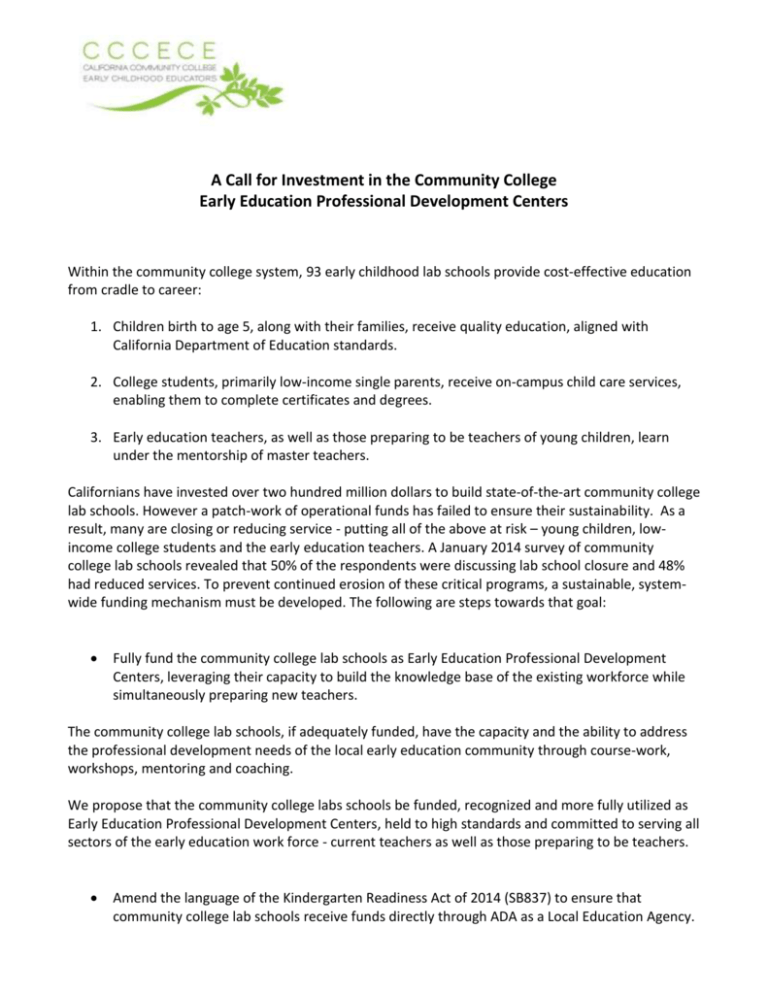Legislative Support for Lab Schools
advertisement

A Call for Investment in the Community College Early Education Professional Development Centers Within the community college system, 93 early childhood lab schools provide cost-effective education from cradle to career: 1. Children birth to age 5, along with their families, receive quality education, aligned with California Department of Education standards. 2. College students, primarily low-income single parents, receive on-campus child care services, enabling them to complete certificates and degrees. 3. Early education teachers, as well as those preparing to be teachers of young children, learn under the mentorship of master teachers. Californians have invested over two hundred million dollars to build state-of-the-art community college lab schools. However a patch-work of operational funds has failed to ensure their sustainability. As a result, many are closing or reducing service - putting all of the above at risk – young children, lowincome college students and the early education teachers. A January 2014 survey of community college lab schools revealed that 50% of the respondents were discussing lab school closure and 48% had reduced services. To prevent continued erosion of these critical programs, a sustainable, systemwide funding mechanism must be developed. The following are steps towards that goal: Fully fund the community college lab schools as Early Education Professional Development Centers, leveraging their capacity to build the knowledge base of the existing workforce while simultaneously preparing new teachers. The community college lab schools, if adequately funded, have the capacity and the ability to address the professional development needs of the local early education community through course-work, workshops, mentoring and coaching. We propose that the community college labs schools be funded, recognized and more fully utilized as Early Education Professional Development Centers, held to high standards and committed to serving all sectors of the early education work force - current teachers as well as those preparing to be teachers. Amend the language of the Kindergarten Readiness Act of 2014 (SB837) to ensure that community college lab schools receive funds directly through ADA as a Local Education Agency. The mandate of the community college lab schools has been to provide student teachers with a supervised field experience with children birth to five. To continue to address this mandate, we request language be added to SB 837 that will safe guard the ability of these programs to provide fullday services to these children and to give future teachers an in-depth field experience. Revise the Department of Education standard reimbursement rate for birth to 5 services to reflect the true cost of operating Title 5 early learning programs. Most of the community college lab schools contract with the Early Education Support Division of the California Department of Education. These programs have had no funding increase since 2006 and are struggling, especially those serving s and toddlers. Infant-toddler services require double the number of adults as compared to preschool, a fiscal burden resulting in a 38% reduction in state-funded infanttoddler slots in the past five years. Add a 1.5 community college lab school adjustment factor to the Department of Education standard reimbursement rate to reflect the teacher preparation component. Community college lab schools contracting with the California Department of Education are reimbursed as if they were typical child development programs, yet they assume the added responsibility of teacher preparation, a component not accounted for in the reimbursement formula. In addition to teaching young children and working with families, community college lab school teachers must work with faculty to effectively supervise the work of student teachers. This requires time for mentoring, observing, reflective dialogue, collaborative planning, and assessment. The Title 5 regulation regarding supervised field work of community college students stipulates that every classroom in which a student completes field work must have a teacher who holds at a minimum the Master Teacher Child Development Permit issued by the Commission on Teacher Credentialing. However the standard reimbursement rate fails to cover the full cost of these more stringent standards. An adjustment factor that reimburses community college lab schools for the teacher education component of the work will correct this historic oversight. California Community Colleges have long been the primary educators of the early education work force. We are located throughout the state. We are governed by locally elected boards of trustees. We are responsive to the changing needs of the field. We have a demonstrated history of working collaboratively throughout the state and within our communities. California has already made an investment in early education within community colleges. Now is a strategic time to build on that investment.











